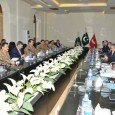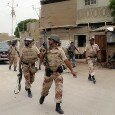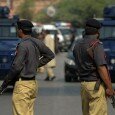By Moeed Pirzada –
Finally, the illegal U.S. use of a weapon of choice pricks global conscience as question are raised over ‘Orwellian’ methods and unaccounted for killings
Emperor with a grim vacuous expression in his eyes is surrounded with courtiers, whose faces are beaming with the intensity and excitement reminiscent of the cheering crowds of Ancient Rome’s gladiator Arena. With gestures of his thumb pointing up or down — perhaps mostly down — Emperor indicates who ought to live and who dies.
No, this is not a scene from Professor’s Tolkien’s Lord of the Rings with dark Lord Sauron in chair trying to control the Middle Earth with his ultimate weapon: One Ring.
Thanks to Jo Becker and Scott Shane of New York Times we now know this is more or less how a former liberal law professor who once took positions against Guantanamo Bay Prison, military commissions and extra-ordinary renditions now decides the fate of insurgents in Pakistan, Yemen and Somalia. And his weapon of choice is Drone.
Evolution of Barack Obama into a national security president while cleverly hanging on to an old — and perhaps fake — liberal resume has baffled many; one of them must be Cameron Munter, the outgoing U.S. Ambassador to Pakistan.
New York Times has now confirmed what many knew in the diplomatic circle of Islamabad that Ambassador Munter had been at odds with Washington complaining that “he did not realize his main job was to kill people”.
It is common belief shared between many in Islamabad and Washington that differences with CIA station chiefs and poker-faced John Brennan, the Chief of Counter-terrorism, had cost Ambassador Munter his job and the number and nature of drone strikes was one of the main sore points.
Apparently, on the face of it, no government has kept a proper record of the drone strikes and who and how many have died is at best a matter of conjecture and dot connecting.
In Pakistan, few months ago, Barrister Mustafa Nawaz, the-then adviser to the-then Prime Minister Yousaf Raza Gilani attempted to get details from both the military and FATA secretariat and was told they only had on their records the total number of drone strikes and no other information.
The dossier
So whatever exists in public discourse on the subject is a compilation by think tanks or NGOs on the basis of claims made in news reports. The London-based Bureau of Investigative Journalism, which runs one such drone monitoring project, estimates that the U.S. has used drone strikes inside Pakistan up to 332 times in the past eight years and at least 800 innocent civilians have died in such attacks.
Other sources maintain that in Pakistan alone, more than 3,000 people have died in such attacks including militants; this perhaps, include around 175-200 children and many women. Though Pakistani governments and military often remain mum, Pakistani politicians and media believe real figures may be much higher.
What is however, clear is that drone strikes before the last U.S. election of 2008 were far and few and have dramatically, escalated under President Obama. New American Foundation has developed a table on the basis of newspaper reports that gives that data year-wise.
Given that organization’s centre right positioning inside U.S. politics the possibility that figures will be on much lower side should be kept in mind. However, the numbers speak for an unmistakable pattern. Between 2004 and 2007 only nine drone strikes happened, four of them in 2007 alone and then suddenly 33 strikes took place in year 2008 which was an election year.
It is difficult to ignore that domestic U.S. politics and its posturing needs have a definite link with the decision-making to make drone attacks inside Pakistan.
|
Year |
Drone Attacks |
Number Killed |
|
2004 |
1 |
5 |
|
2005 |
2 |
7 |
|
2006 |
2 |
23 |
|
2007 |
4 |
77 |
|
2008 |
33 |
314 |
|
2009 |
53 |
725 |
|
2010 |
118 |
993 |
|
2011 |
70 |
536 |
|
2012 |
22 |
163 |
|
Total |
302 |
2843 |
Source: New America Foundation
The dramatic escalation of drone attacks under Obama — around 280 as compared to just 30-35 under Bush — also correspond well to the same domestic political needs.
From Jo Becker and Scott Shane’s brilliant insightful report, Secret Kill List Proves a Test of Obama’s Principles and Will we get a clear glimpse of how and why President Obama had to walk a tight rope between his liberal credentials and realistic judgments to take middle America, Pentagon and CIA along.
While making decisions to end the Iraq conflict and also withdraw from Afghanistan, he simultaneously needed something to burnish his national security credentials.
Drones have become a weapon of choice for him for they can be sold as precise, cost-effective and less politically damaging as compared to all other conventional military tools; for instance, troops on ground in Pakistani border areas or bombing militant hide outs on the pattern of Vietnam and Cambodia.
This tight rope walking and playing clever with the slogans of ‘national security’ has ensured that Obama retains the support of large sections of the democratic vote bank without incurring the unnecessary wrath of those on the right of political divide. It is thus no wonder that today, his counter-terrorism policies are under attack not from Mitt Romney and GOP alliance but American Civil Liberties Union.
“It is the politically advantageous thing to do — low cost, no US casualties, gives the appearance of toughness… it plays well domestically, and it is unpopular only in other countries.” —Dennis Blair, former director of National Intelligence
Dennis Blair, former director of national intelligence (DNI) had succinctly summed up Obama’s strategy when he said: “It is the politically advantageous thing to do — low cost, no U.S. casualties, gives the appearance of toughness…it plays well domestically, and it is unpopular only in other countries. Any damage to the national interest only shows up over the long term”.
These words, with some reflection, also help understand the grim nature of international system and the allegations of an imperial order in which people across the world can be subjected to anything as long as it can be justified to the denizens of Washington, London and Brussels.
To reduce allegations of collateral damage and its accompanied political outfall domestically and internationally, Obama has embraced a disputed — and apparently self-serving — method for counting civilian casualties; any male above military age, who dies in a target zone is automatically considered a militant.
The fact that in the cultural context of tribal areas this logic is simply absurd has no material bearing on American calculus. Their argument is that if someone was innocent he won’t be there. The result of this policy is that CIA is killing large number of men in target areas whose names and antecedents it is not even aware of. These “unpersons” of “George Orwell’s 1984” simply get “vapourized” in thin air without any need of checking who they were. Meanwhile President Obama, the winner of Nobel Peace Prize, keeps on appearing smart, strong and decisive.
The downside is that the Pakistani tribal belt has become a testing lab of guinea pigs for a policy that is essentially, political in nature with wider dividends inside the vast system of power linkages and balances that is Washington.
Unfortunately, for Pakistanis, drones are fast emerging as a centrepiece of U.S. power projection; a new cost-effective style of control and management of insurgencies and all kinds of challenges across many other parts of the world, especially Africa. The question whether drone attacks in themselves serve any real purpose or have achieved something substantial in the context of Pakistan has become meaningless to most decision makers in the U.S.
See no evil
But the question has not lost its importance for a vast majority of Pakistanis. Mohammad Danish Qasim, a student of Media Sciences in Iqra University, Islamabad, is also an ambitious filmmaker. His recent short film of 20 minutes, The Other Side revolved around the social, psychological and economical effects of the drone attacks on the tribal society of Pakistan and was broadly reflective of the national feeling in Pakistan.
This film was selected for the Audience Award for Best International Film at the 2012 National Film Festival for Talented Youth held annually at Seatle, Washington. However, Danish and his team were denied visas.
The U.S. visa officers in Islamabad were alarmed the moment they found out that the film Danish made was on the subject of drones. They advised Danish to change the details in his visa application. He did but was still unable to overcome the paranoia of others in Washington.
U.S. government has an unbelievably bizarre, perhaps schizophrenic, attitude towards its drone policy: Drones exist, but perhaps they don’t. Someone has been making drone attacks, someone was dying, press gleefully reported the deaths and occasionally, when someone considered important as a target was killed then there was chest thumping, celebration and self-congratulations.
Intelligence details were leaked in New York Times and The Washington Post, policy papers were written about the effectiveness of drones and think tanks did seminars and conferences.
Whenever Pakistanis protested, as they did much more in the recent months after the Salala tragedy, then the U.S. told them to shut up since drones attacks will continue.
Last year — after the Osama bin Laden killing and violations of Pakistani territorial sovereignty by American forces — some sections of the Pakistani government debated internally, that may be they should raise the drone issue in the United Nations; the top diplomats told them the U.S. has threatened that if Pakistan dared raise this issue on any international forum then there will be serious repercussions.
“The matter (denial of information) went to (U.S.) court where Obama administration has now filed a motion to dismiss these cases on the grounds that even admitting that CIA could have anything to do with it is against national security”
Taboo subject
But despite all this raging debate across the world, drone attacks somehow have remained a taboo subject for the U.S. government and mainstream media.
It was thus strange when in January of 2012, President Obama made a brief reference and admission that drone attacks are being used against Al Qaeda and affiliates. John Brennan, his chief of counter terrorism, spoke at Woodrow Wilson Center for giving some ethical underpinning to the use of this “weapon of choice” in Obama’s just war. But all this openness was short lived.
When American Civil Liberties Union and New York Times demanded from Justice Department, CIA and Pentagon under Freedom of Information Act to share information about the Drone Program they were denied.
The matter went to the court where Obama administration has now filed a motion to dismiss these cases on the grounds that even admitting that CIA could have anything to do with it is against national security.
If the U.S. position is riddled with hypocrisy and contradictions then unfortunately the Pakistani record is little better.
It is true that public and media at large take a very severe view of drone strikes and consider them against Pakistan’s sovereignty and a violation of human rights. Politicians like Pakistan Tehrik-e-Insaf chairman Imran Khan have consistently embodied this point of view from the beginning.
Moral bankruptcy
But thanks to Julian Assange and Wikileaks we know of the moral bankruptcy of Pakistani elite; we know that the top Pakistani decision-makers have been telling the U.S. interlocutors that they can keep going with drone strikes and we — the Pakistanis — will keep on condemning it in public.
Former military ruler General Pervez Musharraf first allowed the drone strikes and the current military chief was requesting the U.S. in 2008-9 to escalate them. On at least one occasion, the military held a formal briefing, trying to justify the need-based relevance of drone attacks and, on other occasions, pitching the case for sovereign use of drone technology. The latter implies it is solely an issue of sovereignty and once that aspect is taken care of then it is fine.
One can perhaps rationalize the compromises of politicians in power and the military that deals directly with the hyper-power; the U.S. They also suffer from a guilt syndrome since they are unwilling or unable to control the border traffic of militants that goes into and out of Afghanistan and permitting drone strikes then helps them reduce the blame.
But the inability of Pakistan’s liberal classes and its human rights establishment to orchestrate a clear position on that issue is disappointing, to say the least.
Human Rights Commission of Pakistan and various well known and internationally acclaimed civil society and media personalities, who have boldly argued for the rights of Baloch insurgents that are pitched against the military and federal government have mostly remained silent on the issue of U.S. drone strikes and Pakistani military’s excesses in Swat and tribal areas.
Many Pakistanis end up questioning: Who are these liberals and what do they stand for?
Are liberals in Pakistan merely those who believe in their right to hold a glass of wine or whiskey? Or do they have any systematic political belief derived from principles of liberalism and humanity? Are they afraid to raise a voice against the drone strikes because of the fear of the consternation they may cause in Washington or London? Could it be that Pakistani liberalism merely represents a policy of being pro-West and anti-religion?
It is possible that Pakistani human right activists and liberal intelligentsia has been paralyzed because of various factors, including their fear of being seen as sympathetic to the Islamists.
But now the matter has been taken up by the United Nations and it is time for them to strike a common bond with American Civil Liberties Union and the international community on this issue.
United Nations, since long, has been murmuring on the extrajudicial nature of killings by the U.S. drones but predictably, the matter has been conveniently ignored by an overbearing Washington.
But now the issue has suddenly moved up in the international agenda after China and Russia, in the third week of June, jointly issued a statement at the U.N. Human Rights Council backed by other countries condemning the U.S. drone attacks.
Speaking at a conference in Geneva organized by the American Civil Liberties Union, Prof. Christof Heyns, U.N. special rapporteur on extrajudicial killings, ridiculed the U.S. suggestion that targeted drone strikes happening in 2012 are still somehow a legitimate response to the 9/11 attacks more than 10 years ago.
A dangerous trail
He shared his concern with the participants that CIA attacks in Pakistan, Yemen and elsewhere represent a clear threat to the half-a-century long system of international law and would encourage other states to flout long established human right standards.
Perhaps, the mounting temptation in Beijing and Moscow of using drones against their insurgents will focus minds in Washington and London to the implications of their brazen policy agendas.
QC Ben Emmerson, special rapporteur for counter-terrorism, told the conference the protection of the right to life required countries to establish independent inquiries into each drone killing.
It is possible for a state to establish an independent ombudsman to inquire into every attack and there needs to be a report to explain the killings. If states are unwilling or unable to do so then U.N. needs to consider establishing an investigatory body.
Pakistan, which has never mustered the courage to take this matter up in the U.N. was represented by its ambassador to the U.N. in Geneva, Zamir Akram who took this position that more than a thousand civilians have died in U.S. drone attacks and these attacks have neither been accurate nor politically productive.
But what Ambassador Akram will not talk about is the stinking reality is that Pakistan today stands guilty, along with the U.S., of not maintaining any records of the names and ages of all those who ‘vapourized’ in such Orwellian attacks.
Signature strikes
One aspect that may help the U.N. system, the American civil libertarians, Pakistani military and politicians and parts of the U.S. establishment to come together is the issue of “signature strikes”.
In Pakistan, Obama has not only approved the “personality” strikes aimed at named, high value targets vetted by his gory “Death Club” but also the kind of attacks that can rely upon suspicious patterns of behavior observed through aerial surveillance.
David Ignatius, columnist and celebrated author of spy novels, Body of Lies andBlood Money, recently wrote in The Washington Post that Cameron Munter, the outgoing U.S. Ambassador, could live with the named person specific targeting vetted through collected intelligence or to stop something imminent but “signature attacks” against bad guys in general were beyond his tolerance level.
Many in Washington may be thinking the same; International Commission of Jurists in Geneva and other U.N. interlocutors share this wavelength and this can represent a beginning of sorts on the road to correction.
Obama’s fascination with drone attacks, political dividends inside Washington in an election year, moral bankruptcy of Pakistan’s ruling elite and civil intelligentsia, West’s fear and contempt for political Islam and the complexity of making progress inside the U.N. system all together still don’t help us to obfuscate the fact that killing people by CIA drone strikes through hazy images on computer screens managed by CIA contractors represent a system of belief that combines the accuser, prosecutor, judge, jury and executioner at one platform.
This is not an issue of Pakistan or Muslim world; this represents an affront to the whole edifice of rule of law for which countless millions have sacrificed their lives over the past millennia.
The domestic needs of a U.S. president who managed to hide his true face under mumbo jumbo of liberalism should not be allowed to undermine the international system as it has evolved since Second World War. Even the Editor of a theatre of gladiators in ancient Rome often ordered the fight to last till the “finger”. Obama should not compete with Caligula.
Moeed Pirzada is a columnist, media critic and TV anchor
































































































